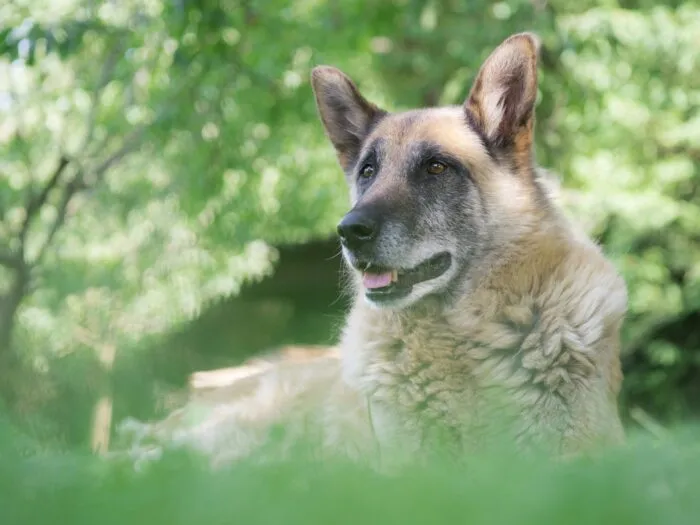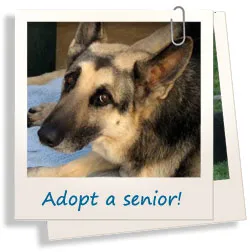 Senior German Shepherd looking lovingly at the cameraWhile many prospective adopters are drawn to the energetic charm of puppies, overlooking senior dogs means missing out on companions who still have a wealth of love and loyalty to offer. Senior German Shepherds, in particular, possess a unique blend of wisdom, calmness, and deep affection that can enrich any home. At “Dog Care Story,” we believe that these mature hounds deserve a loving forever home, and this guide is dedicated to helping you understand the profound rewards of adopting a senior German Shepherd.
Senior German Shepherd looking lovingly at the cameraWhile many prospective adopters are drawn to the energetic charm of puppies, overlooking senior dogs means missing out on companions who still have a wealth of love and loyalty to offer. Senior German Shepherds, in particular, possess a unique blend of wisdom, calmness, and deep affection that can enrich any home. At “Dog Care Story,” we believe that these mature hounds deserve a loving forever home, and this guide is dedicated to helping you understand the profound rewards of adopting a senior German Shepherd.
Many shelters and rescue organizations find it challenging to place older dogs. Potential adopters often shy away from the perceived sadness of a senior dog’s shorter lifespan. However, this perspective often fails to recognize the vibrant personalities and the immense capacity for love that senior dogs still possess. German Shepherds, known for their intelligence and devotion, often mellow gracefully into their senior years, offering a different, yet equally fulfilling, companionship.
Understanding Seniority in German Shepherds
Veterinarians typically consider large breeds like German Shepherds to be entering their senior years around the age of seven. While they can live much longer, often into their early to mid-teens, this stage marks a shift in their needs and capabilities. This is precisely why programs like “Seniors FUREVER!” are vital – to champion the adoption of shepherds aged seven and above. Adopting a senior German Shepherd means embracing a dog that is often already past the boisterous and demanding puppy stages, bringing a sense of calm and established character into your life.
 A group of senior German Shepherds resting togetherThis program offers significant benefits to those looking to adopt a senior dog. By choosing to adopt a shepherd over seven years old, you often qualify for a reduced adoption fee. This fee typically still covers extensive veterinary care, including spaying/neutering, microchipping, de-worming, heartworm testing, and vaccinations – services that would otherwise cost hundreds of dollars. Alternatively, some programs allow adopters to pay the regular fee, which then becomes perpetual. This means that should circumstances change, you can return to adopt another senior dog from the organization at no additional charge.
A group of senior German Shepherds resting togetherThis program offers significant benefits to those looking to adopt a senior dog. By choosing to adopt a shepherd over seven years old, you often qualify for a reduced adoption fee. This fee typically still covers extensive veterinary care, including spaying/neutering, microchipping, de-worming, heartworm testing, and vaccinations – services that would otherwise cost hundreds of dollars. Alternatively, some programs allow adopters to pay the regular fee, which then becomes perpetual. This means that should circumstances change, you can return to adopt another senior dog from the organization at no additional charge.
The Unique Appeal of Adopting a Senior German Shepherd
The decision to open your home to a senior German Shepherd is a deeply rewarding one. These dogs often bring a unique set of advantages:
A Calmer Demeanor
As German Shepherds age, their energy levels naturally decrease. This means they are often content with shorter walks and less rigorous exercise compared to their younger counterparts. For individuals or families seeking a less demanding canine companion, a senior Shepherd can be an ideal fit. They are less prone to destructive behaviors that can stem from pent-up energy and are often happy to simply relax by your side.
Established Temperament and Training
Many senior German Shepherds have lived in homes before and may already be house-trained and possess basic obedience skills. Their personalities are fully developed, allowing you to understand their temperament and preferences more readily than with a puppy. This can make the integration process smoother and less stressful for both you and the dog.
Unwavering Loyalty and Love
Despite their age, senior German Shepherds are renowned for their deep sense of loyalty and affection. They have a lifetime of love to give and are often incredibly grateful for a second chance at a loving home. The bond formed with a senior dog can be exceptionally profound, built on mutual respect and understanding.
Reduced Risk of Certain Behavioral Issues
While puppies require extensive socialization and training to prevent behavioral problems, senior dogs have often already navigated these developmental stages. This can mean fewer surprises regarding their behavior and a more predictable companion.
Questions to Consider Before Adopting a Senior German Shepherd
Before making the decision to adopt, it’s important to honestly assess your lifestyle and capacity to care for an older dog:
- Health Considerations: Older dogs may have pre-existing health conditions that require ongoing veterinary care and medication. Are you prepared for potential medical expenses and the commitment of managing their health needs?
- Energy Levels: While generally calmer, senior Shepherds still require daily walks and mental stimulation. Ensure you can provide adequate exercise for their age and physical condition.
- Time Commitment: Even a settled senior dog needs your time and attention for companionship, feeding, and general care.
- Emotional Preparedness: Adopting a senior dog means facing the reality of their shorter lifespan sooner than with a puppy. Are you emotionally prepared for the inevitable loss?
If you have questions about whether a senior Shepherd is the right fit for you, don’t hesitate to reach out to rescue organizations or shelters. They can provide invaluable insights and help match you with a dog whose needs align with your capabilities. For inquiries, you can email us at Serendipity.email@gmail.com.
Tray’s Poem: A Testament to Senior Dog Adoption
The poem below, written in memory of Tray, beautifully encapsulates the journey and profound impact of adopting a senior dog. It speaks to the hope, love, and unwavering devotion that these magnificent animals offer.
One by one, they pass by my cage,
Too old, too worn, too broken, no way.
Way past his time, he can’t run and play.
Then they shake their heads slowly and go on their way.
A little old man, arthritic and sore,
It seems I am not wanted anymore.
I once had a home, I once had a bed,
A place that was warm, and where I was fed.
Now my muzzle is grey, and my eyes slowly fail.
Who wants a dog so old and so frail?
My family decided I didn’t belong,
I got in their way, my attitude was wrong.
Whatever excuse they made in their head,
Can’t justify how they left me for dead.
Now I sit in this cage, where day after day,
The younger dogs get adopted away.
When I had almost come to the end of my rope,
You saw my face, and I finally had hope.
You saw through the grey, and the legs bent with age,
And felt I still had life beyond this cage.
You took me home, gave me food and a bed,
And shared your own pillow with my poor tired head.
We snuggle and play, and you talk to me low,
You love me so dearly, you want me to know.
I may have lived most of my life with another,
But you outshine them with a love so much stronger.
And I promise to return all the love I can give,
To you, my dear person, as long as I live.
I may be with you for a week, or for years,
We will share many smiles, you will no doubt shed tears.
And when the time comes that God deems I must leave,
I know you will cry and your heart, it will grieve.
And when I arrive at the Bridge, all brand new,
My thoughts and my heart will still be with you.
And I will brag to all who will hear,
Of the person who made my last days so dear.
— Leslie Whalen, in memory of her dog Tray
Adopting a senior German Shepherd is an act of kindness that brings immeasurable joy. These wise souls have so much to offer, and their golden years can be filled with comfort, love, and happiness in a forever home.
References
- Serendipity German Shepherd Rescue Program Information.
